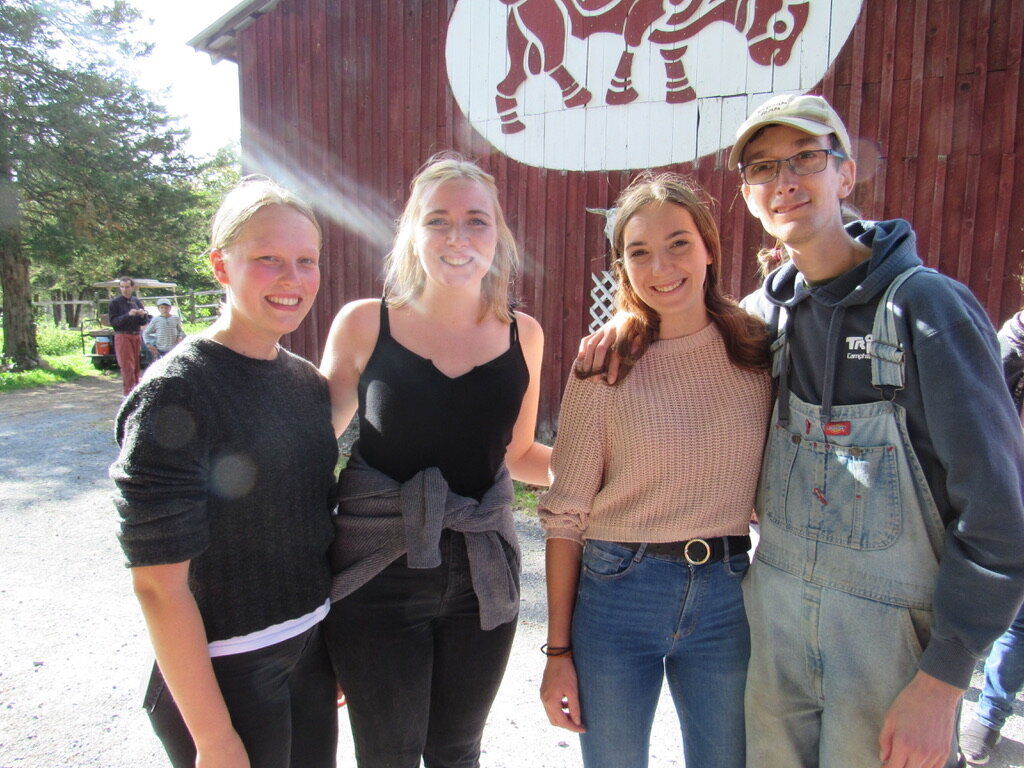Life at Triform
Living with Others
Community living is an enormous change from today’s nuclear family, but one that can be most fun and enriching. You will be living in a house, with long-term coworkers who serve as householders, one or two other volunteers, and four to six young adults with special needs. In addition to the young people with special needs and other volunteers, you may also be living with the young children and teens of the householders. In other words, you may live with ten to twelve people.
You will have your own bedroom, but living with such a large household will mean privacy is always a challenge for everyone. The practical and social aspects of the household will demand a lot of your time and participation, but you will also have some time in each day for yourself.
Rhythms and Routine
Almost everything in Triform is done for and with our community members with special needs. Their ages range from 18-35+ and they have been living at Triform for varying lengths of time. Everyone in Triform is asked and expected to do what they can to help run the community. You will be asked to help with household chores; dishwashing, cooking, laundry and cleaning. The household routine is similar to any family household but on a larger scale, with each member holding some level of responsibility. You will be asked as well to assist the residential young adults to perform their chores. Some volunteers are expected to help the young adults with special needs with their personal hygiene, such as supervising, bathing, tooth brushing, or dressing. In the morning you will be participating in one of the crew or studios with some of the young adults, usually under the guidance of a more experienced coworker. Triform’s crews and studios are the Farm, Garden, Estate, Weavery, Bakery, Home Economics, Pottery, and Forestry. You will support the young adults and other coworkers, applying your skills or learning by doing. Our life very much revolves around the practical, rather than the theoretical side of therapeutic work (social therapy).
While vocational work training continues in the afternoon for some of the young adults, the majority of them attend afternoon classes in painting, history, eurythmy, handwork, drama, and botany. You may be asked either to continue supporting in the work areas or to assist (or even teach!) in the courses. In the evening, you may be responsible for helping with supper, or you may be invited out to eat at another house, or occasionally to go to a restaurant with people from your house. Evenings are open for social activities, necessary community or house meetings, study groups, or recreation. Because our days are full, it is common for the young people with special needs to retreat to their own rooms by nine o’clock or earlier, to listen to music or tend to personal needs. We do not have regular television viewing at Triform, although some houses may sometimes rent movies. Your social initiative and involvement in the evenings are greatly appreciated. For example, you could spend an hour one evening reading aloud for people in your house, or helping them write letters, or playing your guitar (or whatever your instrument may be). Weekends usually have ample time for relaxing. We clean our houses on Saturday mornings and have Bible evenings on most Saturday nights. There is usually an outing: a shopping trip, a hike, a trip to a museum or historical site, or concerts, plays or movies.
Time Off
The practical and social aspects of the house demand much time and participation from everyone, but there is usually some time each day that can be personal or private time. You will have one day a week as a free day. You will have some time off during the Christmas break, the February winter break, and the Easter break. In addition, you will have three weeks of vacation time, usually during the summer months to travel or do as you please.
Spiritual Element
Many of the people who are attracted to live in a Camphill community are consciously striving on a spiritual path and connect with anthroposophy, the world view that underlies our work. The daily rituals and rhythms and the yearly cycle of festivals are essential aspects of the therapeutic environment that we try to create for our young people with special needs. We hope our spiritual striving is also manifest in the very attitude we hold towards each other, towards the environment and the ethical and cultural development of the future. We try with conscious deliberation to deal with each aspect of our lives, whether it is the difficult destiny of the person with special needs or how much to plant in the garden.
We hold our own services, and we celebrate the Christian festivals in a creative and living way, often with plays, music or pageantry. We begin each meal with a grace, and it is common to have a daily Bible reading in each house. At Saturday night Bible evenings, which are common in Camphill communities worldwide, everyone has the chance to speak about the week’s reading in an atmosphere of respect and receptivity to the individual contribution.
Some new coworkers, whatever their age, may feel uneasy about the religious and spiritual component of community life. It does indeed present an inner challenge. You may be asked to support the needs of the individual with special needs in this realm, if needed. An example of this would be to accompany someone who physically needs a helping hand to the Sunday Service, but you could choose not to attend yourself. Your own freedom to think and feel as you wish will be absolutely respected. You will be given an opportunity to develop an understanding of our work and philosophy through study groups and orientation sessions.
→ Next: College Loan Grants
→ Apply Now
← Back: Coworkers & Households

